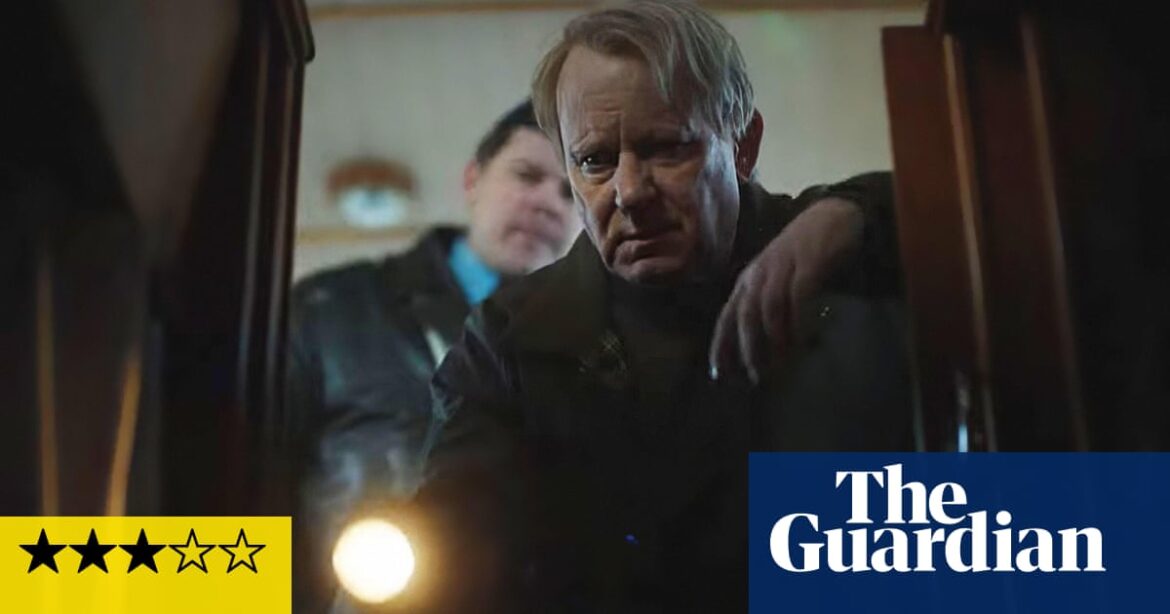
This intense psychological drama has a squid in the sky problem. Specifically it’s that, by its halfway point, Ran Huang’s rarefied Scandinavian crime feature has fully established a predilection for spooky visual motifs, including eerie establishing shots and nocturnal scenes so murky it’s hard to know what’s going on (although the keening, discordant musical soundtrack suggests it’s probably something bad). And then seemingly out of nowhere, after a particularly emotional moment, there’s a cut to a forest treeline where some kind of cephalopod is floating in the sky, tentacles waving like one of those plastic “sky dancers” often seen in American car dealerships’ parking lots. Is it supposed to be a hallucination of the main character, Mats Lake (Gustaf Skarsgård), a troubled psychiatric patient who has recently confessed to a string of murders? Immediately after the squid shot, which lasts all of 12 seconds, the next one is of an impassive policeman smoking a cigarette, looking at the sky. Is he the one who sees the giant sea creature up there, but is somehow not even bothered? Is it supposed to be a metaphor? Or one of those fancy film-school distancing effects?
Given that the beastie is never explained, I’m guessing it’s meant to be a vexingly opaque symbol of what’s going on in the film itself. Basically, here is something bizarre and totally inexplicable happening in the peaceful Scandinavian countryside that’s so odd that nobody can process it – so no one comments on it, as if it’s not even happening. That would apply equally to the child murders Mats lays claim to, as well as the sexual abuse he claims his own father subjected him to when he was a child – abuse that his brother, Ralf (Magnus Krepper), does not recall at all. But Mats’ therapist, Anna Rudebeck (Andrea Riseborough), believes what Mats is saying, as does police detective Soren Rank (Stellan Skarsgård). Their faith in Mats as both perpetrator and victim is so profound that, when the evidence starts looking shaky and Mats fails to lead the police to a single victim’s body, they go on believing in him for reasons connected to their own troubled psyches.
Given that the Skarsgårds, father and son in real life, are performing a script co-written by Huang and Stellan’s wife, Megan Everett-Skarsgård, the twisted meditation on family dysfunction comes over strong, and the cast are uniformly excellent. Stellan Skarsgård and Riseborough are already well-known quantities and dab hands at playing these kind of troubled souls, but Gustaf is especially extraordinary here: simultaneously fragile as a dragonfly and repellent, whispering calmly one minute and screaming with shame, confusion and pain the next. It’s a fantastically well-modulated performance, but the film’s obliqueness underserves it.
What Remains is actually based on a true story, that of psychiatric patient Sture Bergwall, who also went by the name of Thomas Quick. It’s understandable that Huang and Everett-Skarsgård should have changed the names of the people involved for the purposes of drama, but the film is so determined to maintain its ambiguity it ends up obscuring the most important parts of the story: institutional malfeasance and that very 1990s affliction, false-memory syndrome. It just doesn’t want to explain why there’s a squid in the sky and that decision detracts from what could have been a much more interesting and rich work, given the impressive casting. Sometimes you need to talk about the giant calamari in the room.
Source: theguardian.com



